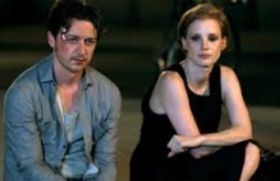 I feel like I could write a treatise on grief as portrayed in pop culture. First, I survived (suffered?) through the entire season of HBO’s much-talked-about show The Leftovers, a series that posits the question: what would happen if 2 percent of the world’s population vanished all at once, with no explanation? It is about those left behind, specifically those in one small town in upstate New York. The Leftovers has been setup to be a little bit of a sci/fi/mystery/thriller/psychological drama in the spirit of Lost, especially considering it shares the same creator, Damon Lindelof. But I’ve found the most fascinating parts of The Leftovers not to be the mystery elements, but the straightforward humanistic elements of grief the show puts forward based on the main plot point that drives the show. The essence? Everybody deals with grief differently. The Leftovers shows just how differently. It’s an intense, depressing, dark, heavy and sometimes maddening show, but that thread that runs through it is so rich, it makes for a visceral viewing experience—at least for me.
I feel like I could write a treatise on grief as portrayed in pop culture. First, I survived (suffered?) through the entire season of HBO’s much-talked-about show The Leftovers, a series that posits the question: what would happen if 2 percent of the world’s population vanished all at once, with no explanation? It is about those left behind, specifically those in one small town in upstate New York. The Leftovers has been setup to be a little bit of a sci/fi/mystery/thriller/psychological drama in the spirit of Lost, especially considering it shares the same creator, Damon Lindelof. But I’ve found the most fascinating parts of The Leftovers not to be the mystery elements, but the straightforward humanistic elements of grief the show puts forward based on the main plot point that drives the show. The essence? Everybody deals with grief differently. The Leftovers shows just how differently. It’s an intense, depressing, dark, heavy and sometimes maddening show, but that thread that runs through it is so rich, it makes for a visceral viewing experience—at least for me.
And now, here comes The Disappearance of Eleanor Rigby. Following on the heels of The Skeleton Twins, a movie about the bonds of two people through depression, and right after a summer watching The Leftovers, this movie felt like the grand finale of the Bummer Trilogy. The Disappearance of Eleanor Rigby is about a married couple who are torn apart by tragedy and are trying to figure out, individually and together, if they can ever get whole again.
I know, I know, it sounds really morose and everything leading up to this sentence makes you want to run screaming in the opposite direction from this movie. But here’s the thing. The Disappearance of Eleanor Rigby is a movie about grief that is actually not depressing. First-time writer/director Ned Benson has created a wonderful little movie (a true indie gem) that hits all the right tones and notes here and it is a movie about what happens after grief—it’s about what we must do to find our feet again, find ourselves again, learn to breathe in and out again, learn to live again. But mostly, yes, it is a movie about how grief can tear apart even the closest bond, and shake someone to the core and cause them to question everything. How is this not depressing? Because this movie is not about grief necessarily, but about the journey away from grief and back to living. Everybody grieves differently, and each person’s journey is different and this movie is about two specific paths, hopefully back to each other.
What truly lifts the experience of The Disappearance of Eleanor Rigby from a depressive downer is the performances of the two leads, Jessica Chastain and James McAvoy as the married couple, Eleanor and Conor. Chastain is particularly dynamic as the grieving Eleanor, who is so swallowed by her grief, she feels she has truly lost her own identity and spends the movie trying not only to figure out if she still loves Conor, but if she even likes or knows herself. McAvoy, for his part, manages to walk the fine line between anger and restraint, wonderfully showing a vulnerability and delicacy that makes him one of Hollywood’s most underrated leading men. But this is Chastain’s movie, as it is Eleanor’s journey that keeps you riveted, and Chastain’s capacity for dual fragility and strength in the same moment is bewildering. This is a performance without any flash, but what it has is a consistence of texture and depth and a character whose layers we see peel off in front of our own eyes until she is bare and exposed in a moment so raw it makes you ache.
I won’t expect anyone to rush out to see this movie unless you are a fan of these actors, which I am, which is why I did. And I was rewarded with a surprisingly moving film with incredible performances (from a top-notch cast all around) that, hopefully, will still be remembered come awards season. But, at the very least, I can maybe finally put the depressing movies and TV shows behind me and look forward to the happy movies of Oscar season. Ha.
